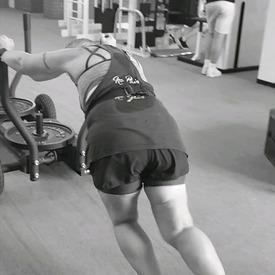Marathon training and VO2 max

RunnerGirl238
Posts: 448 Member
Morning,
So I'm knee deep in marathon training now. My coachds are pushing the LISS runs and running at my long slow pace.
I'm used to pushing it. I'm used to speed work. I miss it. More importantly, my VO2 max is decreasing. Have you found that upping your long term endurance decreases your VO2max?
I don't want to lose my aerobic fitness, especially for shorter races. Any suggestions for keeping my VO2 sustained while still following coache's orders?
So I'm knee deep in marathon training now. My coachds are pushing the LISS runs and running at my long slow pace.
I'm used to pushing it. I'm used to speed work. I miss it. More importantly, my VO2 max is decreasing. Have you found that upping your long term endurance decreases your VO2max?
I don't want to lose my aerobic fitness, especially for shorter races. Any suggestions for keeping my VO2 sustained while still following coache's orders?
0
Replies
-
Though I don't run much, and stick to 1/2 distances or so for workouts, I'm similar. I find that too much LISS work seems to allow my VO2max to slip, and I just don't like it. And similar to you, even though I don't compete these days I like to push hard. So I almost always do at some point, and add in some fairly high intensity intervals and such.
Maybe they have a plan long term, or aren't aware you still want to maintain or improve your short race times. I'd suspect they just don't want you "wasting" training time with intensity stuff when the current goal is distance. That or risk of injury.... though personally I'd say the injury risk increases with miles.1 -
Before I started marathon training on 1st Jan my vo2 max was 46, by the time I ran my 2nd on 28th april it was down to 39.
The good news is it's coming back up quite quickly now I'm concentrating on halfs and below and pushing hard in shorter training runs again. Back up to 44 now and fingers crossed itll go up those final 2 points over the next couple months.0 -
how are you measuring VO2 Max? have you gone and had your zones calculated through an actual scientific test or are you using general zones?
honestly, if you are basing it off like your garmin - i wouldn't worry - that is just a snapshot in time - it isn't a long term measure that i would rely solely on - and is influenced heavily by daily factors; whereas if you have done an actual VO2 Max test - then i would be more concerned
recommend, if you haven't, reading some of Matt Fitzgerald's 80/20 training plan info1 -
deannalfisher wrote: »how are you measuring VO2 Max? have you gone and had your zones calculated through an actual scientific test or are you using general zones?
honestly, if you are basing it off like your garmin - i wouldn't worry - that is just a snapshot in time - it isn't a long term measure that i would rely solely on - and is influenced heavily by daily factors; whereas if you have done an actual VO2 Max test - then i would be more concerned
recommend, if you haven't, reading some of Matt Fitzgerald's 80/20 training plan info
I second this. Don't rely on the Garmin at all. Mine predicts I can run a full in 3:30.0 -
deannalfisher wrote: »how are you measuring VO2 Max? have you gone and had your zones calculated through an actual scientific test or are you using general zones?
honestly, if you are basing it off like your garmin - i wouldn't worry - that is just a snapshot in time - it isn't a long term measure that i would rely solely on - and is influenced heavily by daily factors; whereas if you have done an actual VO2 Max test - then i would be more concerned
recommend, if you haven't, reading some of Matt Fitzgerald's 80/20 training plan info
Yes, this. Garmin thinks your VO2 Max is decreasing because you haven't been recording many of those types of runs. I wouldn't worry about it. Those long runs will help you to maintain that fitness, if if it doesn't feel like it. That said, just because you are training for a marathon doesn't mean that you need to completely eliminate speed work. I still do one day of hill repeats or speed intervals and one day of tempo at HM pace or faster during my training cycle. I also second reading some of Matt Fitzgerald's 80/20 plan info. His plans have gotten me my best race results ever and they incorporate the type of training I mentioned here.
ETA: I am not suggesting that you don't follow your coaches' advice, but if they are telling you to eliminate speed work completely, you might want to have a conversation about it. Many novice plans eliminate speed work to focus on the increased mileage load and relieve some of the stress of heading into that uncharted territory of higher mileage long runs, but if you think you can handle it, talk to them. Just remember, if you haven't already hit those 20 mile long runs, when you do, you will be feeling it.2 -
I never paid much attention to VO2 Max in all my years of cardiovascular conditioning workouts. Now that I'm a Garmin user, I notice it. Speed work and other non-running anaerobic-oriented workouts push my numbers out while less of it and more slower-running longer duration workouts lower it. Still think distance covered and time to do so is a more running measure, for me, or the time it takes to complete a certain KB complex. I like resting heart rate stats too.1
-
As lporter said, talk to your coach. If this is your first marathon, he/she may be worried that you can't handle the increase in distance while maintaining intensity, or they may be intending to add more speed later in the plan. Pfitzinger's plans do LT once a week in the early weeks and VO2max in the last weeks, but he also includes strides throughout the plan to keep some VO2 training going on. Strides might be an option to keep you happy while you are adding to your base milege.1
-
Lactate Threshold is a better number to look at for distance running. However, I agree. If you're using your watch for the measurement it could be off and may change weekly. Plus, even if you are losing some it will return quickly when you switch your workouts.
Good luck.1 -
Thanks yall. I tend to do strides at the end of every run anyway. Big believer in finishing strong. The coach is big into physiology- fast twitch vs slow twitch muscles, prepping the liver to release fuel, etc. I am used to speed work...i know a marathon is a whole new beast in comparison to the half marathons I'm used to.1
-
The only good thing about the Garmin VO2max estimate is the little nugget they add to make you feel good.
Mine is estimated at 45mg/kg/min, and the message is: "Your fitness age is 20. That's the top 15% for your age and gender."Well, make me blush! I am over 50!
The truth is that this metric is only roughly estimated by your device based on your stats and HR while jogging/running. If you don't jog or run outdoors, the estimate will be way off. Even if you run outdoors, the estimate is not perfect. Mine increased for the first 4 months I owned the watch, then has bounced between 44 and 45 since then. When it goes up, I throw a little party. When it goes back down, I cry in my beer.3 -
Garmin told me 70-74... I just got tested in a university lab....73
If you are training continuously then it’s not going down unless you are radically changing how you work out.
I would disregard the jumps, they are based on HR which is influence by a lot of variables. I have seen numbers as low as 65 and as high as 74 on my Garmin all in the last year.
VO2 is pretty trainable but more than a 20% increase is hard. Also know it’s based on body weight. I am very lean, as being lean is very important in endurance sports. I was actually at 5.5% body fat (water test) when I tested my vo2 in the lab. I was training for a hill climbing race so I wanted to be small.
If you are losing weight and training a lot it will go up. Especially with intervals. But volume can also raise it. If your weight is staying the same the increases will be slower especially if you have a long history training. If you are gaining weight it will obviously decreases.
Also know there is a difference between absolute and relative vo2 max. Garmin measures relative.
So many variables but it’s probably within 10% accurate
John0 -
It's probably not current, because now I believe they include HRV in the mix, plus the pace/HR/weight estimates.
But for FirstBeat that Garmin used (do they still, or only certain devices?):
VO2max=(male 1, female 0)*10.987+56.363+1.921*(Physical Activity Rating, remember the PAR chart)-0.381*age-0.754*BMI
That PAR 1 thru 10 is now based on all workouts that the devices sees over time, and so it's constantly changing - don't know how they average the weekly values, how far back in time they go.
And if they go for still whole numbers only, or decimal averages.
But that in itself makes it change.
FirstBeat years ago had some science papers where they said they tweaked the formula found in this study.
https://www.ncbi.nlm.nih.gov/pubmed/2287267
0 -
Races are run, people don't enter a race, announce their VO2, and the highest number wins.4
This discussion has been closed.
Categories
- All Categories
- 1.4M Health, Wellness and Goals
- 397K Introduce Yourself
- 44.2K Getting Started
- 260.9K Health and Weight Loss
- 176.3K Food and Nutrition
- 47.6K Recipes
- 232.8K Fitness and Exercise
- 456 Sleep, Mindfulness and Overall Wellness
- 6.5K Goal: Maintaining Weight
- 8.7K Goal: Gaining Weight and Body Building
- 153.3K Motivation and Support
- 8.3K Challenges
- 1.3K Debate Club
- 96.5K Chit-Chat
- 2.6K Fun and Games
- 4.5K MyFitnessPal Information
- 16 News and Announcements
- 18 MyFitnessPal Academy
- 1.4K Feature Suggestions and Ideas
- 3.1K MyFitnessPal Tech Support Questions










